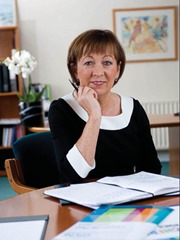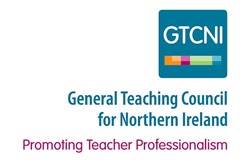Teachers are the future of education
 Dr Carmel Gallagher, recently appointed Registrar of the General Teaching Council for Northern Ireland, reflects on her first year leading GTCNI’s campaign to promote greater understanding and respect for teaching as a profession and its vital contribution to the present and future of education.
Dr Carmel Gallagher, recently appointed Registrar of the General Teaching Council for Northern Ireland, reflects on her first year leading GTCNI’s campaign to promote greater understanding and respect for teaching as a profession and its vital contribution to the present and future of education.
It has been recognized that “no education system can exceed the quality of its teachers” (McKinsey Report, 2007). That is why the best performing education systems in the world maintain a very high regard for the teaching profession and invest heavily in supporting and developing teachers.
This continues to be a challenging perspective to advance in Northern Ireland, at a time when the educational support services have been in decline as a consequence of the delay in implementing the Education and Skills Authority. It continues to be a challenge to convince politicians and the public of the high value of teaching, partly because of the enduring tendency to hold schools to account for more than they can be accountable for and partly because everyone was once at school and so has formed an opinion about education drawn from their own memories and experiences.
It is this sense of familiarity with schools that leads politicians, civil servants, their advisers, the media and the public to think they understand the issues facing schools; to think that addressing the challenges of underachievement are simply about getting teachers to ‘raise standards’. As a consequence there is a tendency to develop policies that are not always adequately researched or effectively implemented, while failing to address issues of socio-economic deprivation, endemic unemployment and low community aspirations that are the real causes of underachievement. If medicine was to develop remedies on the basis of such insights, the public might have cause for grave concern.
If policy-makers were to stand in a classroom for even just one day they might form a very different view of the demands and challenges of teaching up to 30 young people aged between 4 and 18 in the current climate. Parents need only think of 30 versions of their own child facing them in a classroom to gain a more realistic conception of the challenges of teaching and learning. Those who work in any kind of business might reflect on the challenge of dealing with 100% of their customers on the ‘shop floor’ all day, some of whom have very specialist needs and demands. Business leaders might like to reflect on the challenge facing school principals, trying to lead their staff often without the human resource or financial management services to run a very complex organisation or the availability of staff training to meet the challenges they face.
GTCNI’s mission is to promote the status of the teaching profession in Northern Ireland by enhancing political and public understanding of the complexity of teaching and of the hugely important contribution teachers make, not only to the lives of young people, but also to the future of our society and its economy. Part of that mission is to enhance political understanding of the need for more research-based policy development. A large part of the challenge however is to convince teachers themselves of the need for the very existence of a professional body like GTCNI and why it is important that such a body is independently supported by a registration fee.
A professional body is there to ensure, through registration, that only those properly qualified can practice. It ensures through self regulation that professionals meet certain agreed standards of practice and conduct. It advocates for career-long professional development so that members keep up-to-date with changes in the profession. Most importantly, it speaks up on behalf of the profession against policies or practices that may damage professional practice or harm clients or the profession’s standing.
In order for teaching to claim parity of esteem with other professions, GTCNI is working to help promote an approach to professionalism that appreciates why every teacher needs to be registered – so that only those who are properly qualified can teach in our schools; that appreciates why professionals need to continuously enhance their skills; that appreciates why we need to regulate the conduct and competence of our own profession; and that appreciates why we need to develop a strong and united voice in shaping the direction of education policy. Our aim is to enhance political and public understanding of teaching as a complex and demanding profession, which makes a vital contribution to the present and future of education; and which requires and deserves public respect and investment.
So what has GTCNI been doing over the last year to respond to these challenges? Firstly, we have replaced the annual certificate that teachers used to receive at this time of year with a small fold-over professional card that teachers can slip into their wallets to signify their registered status as a member of a professional body.
Secondly, in preparation for the new legislation to be introduced in 2015 to make GTCNI the professional regulator, we have begun developing professional regulation processes which will involve the profession itself in reviewing the competence of the very small number of teachers who, following action by their employers, may be referred to this Council for consideration as to whether or not they should remain on the register.
Thirdly, we have proposed that all teachers are given access to a progressive range of professional development opportunities throughout their careers, aligned to a revised set of competence standards. We are working proactively with all major stakeholders to influence this framework and have commenced work to revise and align the competence standards to school development planning, school self evaluation, performance review and staff development.
Fourthly we have replaced the ‘Term Talk’ magazine with a new ‘Professional Update’ e-zine which aims to provide teachers on a regular basis, with readable summaries of important research or other news relating to teaching, learning and assessment to inform their professional practice.
Finally, and most importantly of all, GTCNI believes that the voice of the profession should lead educational policy thinking and development. We have been working hard to make sure teachers’ views are gathered and teachers’ voices are heard on major issues of concern to the profession. In my first term in post I have met with many primary principal associations and area learning communities.
We have recently published startling results from an independent survey of 500 teachers’ views about new arrangements for the assessment of pupils at ages 8, 11 and 14, which has already influenced policy. We have also just published a major submission to the Education Committee Inquiry into the Education and Training Inspectorate and the School Improvement Process, entitled ‘Striking the Right Balance’, which offered 20 research-informed recommendations informed by international research.
Since “no education system can exceed the quality of its teachers” GTCNI will continue to promote the message that investment in teachers is the best way to ensure the future health of our education system and the success of our young people.
For further information on the work of GTCNI, please visit www.gtcni.org.uk and follow us on twitter: twitter.com/GTCNI
 General Teaching Council for Northern Ireland
General Teaching Council for Northern Ireland
3rd & 4th Floor, Albany House
73-75 Great Victoria Street
Belfast BT2 7AF
Tel: +44 (0) 28 9033 3390
Email: communications@gtcni.org.uk





